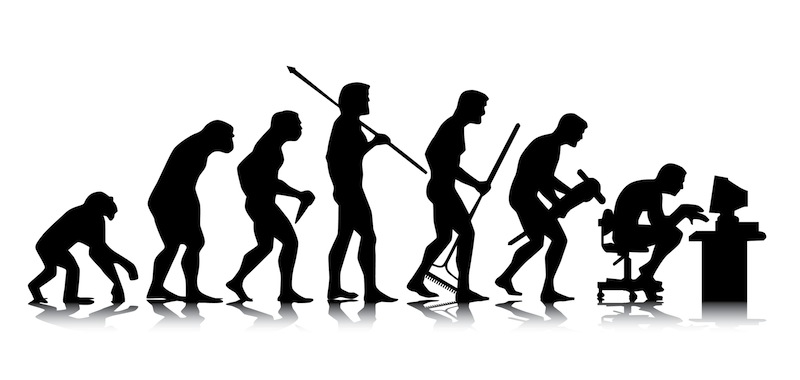Evolution is not deterministic - Unless you're a creationist of course...
I'm working my way through some papers on organisational change at the moment (writing a paper, which is why this blog has been a bit quiet) and as a molecular biologist by training I'm finding the (mis)use of the word "evolution" extremely irritating.
Kezar (2001), in defining the evolutionary model of change states: "evolution is basically deterministic, and people have only a minor impact on the nature and direction of the change process" (page 29). Deterministic systems always produce the same outcome from the same starting conditions.
A similar error is conveyed more visually by the many evolution pictures and cartoons in circulation:


As much as I enjoy laughing at these, they're also fundamentally wrong. Evolution is a non-deterministic process. Claiming anything else is to stray from science into creationism. If we were somehow able to set up a new earth with exactly the same conditions as ours had 4 Billion years ago, we're more likely to have a planet of algae than we are to have intelligent mammalian bipeds.
Organisms with comparatively simple genomes such as viruses, parasites and symbiotes are just as evolved as humans are. Evolution is a process by which incremental change occurs in response to changing environments. Any directionality or determinism that is observed is in response to those conditions, as species that are better suited to the new conditions thrive and others die out.
Increasing complexity, both of organisms and organisations, is a consequence of stability in the environment over time. Any number of studies (such as the ongoing experiment with the human colonisation of New Zealand) have shown that rapid changes (i.e. that happening over less than hundreds of thousands of years) results in a simplification of the ecology and the extinction of the more complex, highly adapted organisms. The critical point here is that adaptation is not evolution; adaptation along with selection for successful changes is what drives evolution, but unless you are a creationist, there is no long term goal in mind.
However, this is still evolution, and all of the organisms that remain are just as evolved, although they may well not be as adapted. Flexibility, inevitably comes at the cost of efficiency, but it does make it more likely that the organism (or the organisation) will survive rapid change. The relentless drive to efficiency in contrast only works while the conditions remain static - being efficient at yesterday's requirements rather than tomorrows is a lesson for extinction.
Creationism offers the comforting scenario that the changes that occur in evolution have a higher purpose. There is no evidence that this is true in biological systems. However, this is where the evolution analogy breaks down in the context of organisational change. Unlike biological systems there is some hope that organisations are lead and guided by people with a vision that is not merely adaptive and reactive, but rather purposeful and planned. Unlike biological creationism, organisational creationism is essential in higher education if societies want to control their cultural and intellectual development rather than have commercial interests define it for them.
We have the opportunity as thinking beings to guide our organisation's development and evolution in ways that achieve long-term outcomes of value. At the species level, which is to say as a sector, we can choose a direction for the development of institutions (organisms) that is planned rather than reactive. Sadly the evidence within higher education suggests that instead we are focusing our energies on the immediate environment.
The ability of academics to freely choose how they teach and conduct research and interact within their organisations is widely cited as a key strength in academia, and I certainly think it has a lot of value. To stretch the biological analogy a little further however (too far perhaps?), when the cells of an organism exhibit similar behaviour, we call it cancer and treat even the benign forms with caution and suspicion. There's certainly no evidence to suggest that cancer results in positive evolutionary change.

